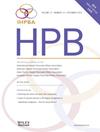利用虚拟协作启动机器人胰十二指肠切除术项目
IF 2.7
3区 医学
Q2 GASTROENTEROLOGY & HEPATOLOGY
引用次数: 0
摘要
机器人胰十二指肠切除术(RPD)的采用率越来越高,但安全引进该技术面临挑战,包括现场专家监考的局限性。我们开发并实施了一种结构化方法,利用虚拟协作安全引进新的 RPD 项目。我们设计了一个结构化框架,用于引入 RPD 计划;关键步骤包括获得额外培训、确定所需资源、建立专门团队以及考虑患者安全因素。在远程手术指导中,利用虚拟协作与监查员进行双向交流。在最初的队列中,围手术期数据和术后结果均从前瞻性维护的数据库中提取。从 2020 年 8 月到 2023 年 12 月,共有 68 名患者接受了 RPD 手术。中位手术时间为 407 分钟,估计失血量为 150 毫升。中位住院时间为 8 天。90%的切除术获得了阴性边缘。后半部分病例的手术时间明显短于前半部分病例(380 分钟 vs 441 分钟,P < 0.01),转阴率也有所下降(6% vs 21%)。通过虚拟专家合作,安全启动结构化 RPD 计划是可行的。只要考虑周全、环境适宜,即使是最初的病例,也能获得极佳的围手术期效果。本文章由计算机程序翻译,如有差异,请以英文原文为准。
Initiation of a robotic pancreatoduodenectomy program using virtual collaboration
Background
Adoption of robotic pancreatoduodenectomy (RPD) is growing, although there are challenges for safe introduction of this technique, including limitations in on-site expert proctoring. We developed and implemented a structured approach for safe introduction of a new RPD program using virtual collaboration.
Methods
A structured framework for introducing a RPD program was designed; key steps included obtaining additional training, identifying required resources, establishing a dedicated team, and patient safety considerations. Virtual collaboration with a proctor for bidirectional communication was utilized for remote operative guidance. In the initial cohort, perioperative data and postoperative outcomes were extracted from a prospectively maintained database.
Results
From August 2020 to December 2023, 68 patients underwent RPD. The median operative time was 407 min with an estimated blood loss of 150 mL. Median length of stay was 8 days. Negative margins were obtained in 90% of resections. Operative time was significantly shorter in the second half of cases compared to the first (380min vs 441min, p < 0.01) and rate of conversion decreased (6% vs 21%).
Conclusion
The safe initiation of a structured RPD program is feasible through virtual expert collaboration. With careful consideration and an appropriate environment, excellent perioperative outcomes are achievable even for initial cases.
求助全文
通过发布文献求助,成功后即可免费获取论文全文。
去求助
来源期刊

Hpb
GASTROENTEROLOGY & HEPATOLOGY-SURGERY
CiteScore
5.60
自引率
3.40%
发文量
244
审稿时长
57 days
期刊介绍:
HPB is an international forum for clinical, scientific and educational communication.
Twelve issues a year bring the reader leading articles, expert reviews, original articles, images, editorials, and reader correspondence encompassing all aspects of benign and malignant hepatobiliary disease and its management. HPB features relevant aspects of clinical and translational research and practice.
Specific areas of interest include HPB diseases encountered globally by clinical practitioners in this specialist field of gastrointestinal surgery. The journal addresses the challenges faced in the management of cancer involving the liver, biliary system and pancreas. While surgical oncology represents a large part of HPB practice, submission of manuscripts relating to liver and pancreas transplantation, the treatment of benign conditions such as acute and chronic pancreatitis, and those relating to hepatobiliary infection and inflammation are also welcomed. There will be a focus on developing a multidisciplinary approach to diagnosis and treatment with endoscopic and laparoscopic approaches, radiological interventions and surgical techniques being strongly represented. HPB welcomes submission of manuscripts in all these areas and in scientific focused research that has clear clinical relevance to HPB surgical practice.
HPB aims to help its readers - surgeons, physicians, radiologists and basic scientists - to develop their knowledge and practice. HPB will be of interest to specialists involved in the management of hepatobiliary and pancreatic disease however will also inform those working in related fields.
Abstracted and Indexed in:
MEDLINE®
EMBASE
PubMed
Science Citation Index Expanded
Academic Search (EBSCO)
HPB is owned by the International Hepato-Pancreato-Biliary Association (IHPBA) and is also the official Journal of the American Hepato-Pancreato-Biliary Association (AHPBA), the Asian-Pacific Hepato Pancreatic Biliary Association (A-PHPBA) and the European-African Hepato-Pancreatic Biliary Association (E-AHPBA).
 求助内容:
求助内容: 应助结果提醒方式:
应助结果提醒方式:


